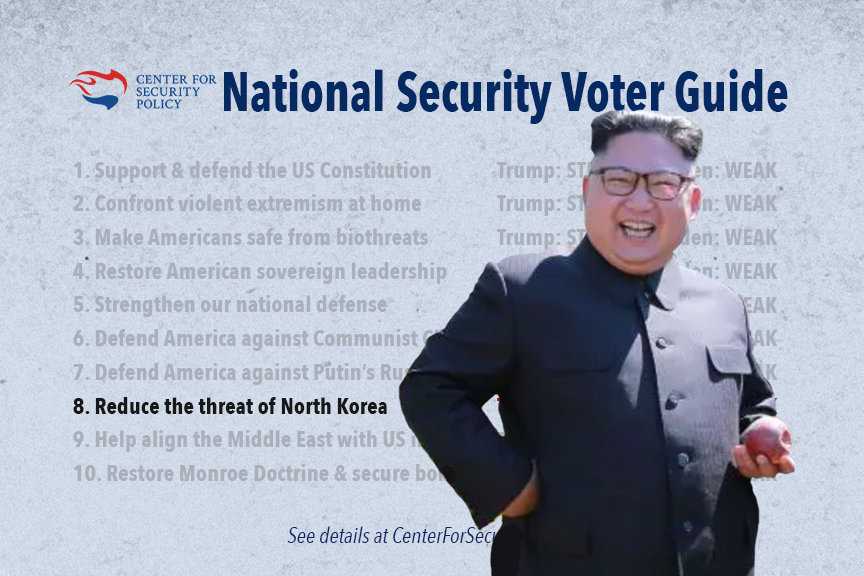National security rating #8: Reduce the threat of North Korea

North Korea has plagued the United States for nearly 70 years, with the Korean War still legally unresolved. The impoverished country with its rogue regime is no longer a mere threat to American interests and allies in Asia, but has been developing an ICBM force capable of firing nuclear weapons at the United States.
The North Korean threat requires a huge expenditure of American troops in South Korea, and places stresses on the US Navy and Air Force. It is a problem that has to be solved without resort to full-scale war, which is why it appears on the Center for Security Policy’s 2020 National Security Voter Guide list.
Joe Biden. Joe Biden generally took the middle-of-the-road status quo approach throughout his career as United States senator and vice president. In nearly half a century since entering public service, Biden has said or done little to distinguish himself in solving the North Korea problem.
Donald Trump. Donald Trump took an especially brash, innovative approach to test North Korean leader Kim Jong-un, a strategy he called Maximum Pressure. During his first year in office, Trump significantly increased pressure on North Korea by successfully enlisting other nations to enforce UN sanctions against Pyongyang and warning North Korea that its surging missile and nuclear weapons programs could lead to war. This included an unprecedented warning by the president in his September 2017 speech to the UN General Assembly in which he the US would “destroy North Korea” if it threatened US security or the security of our allies.
Trump’s Maximum Pressure strategy convinced North Korea to agree to talks in 2018. Taking a calculated risk, Trump met personally with Kim in the first meeting between an American president and a North Korean leader. Trump deliberately met with Kim one-on-one, cutting out China and Russia which have a history of acting as advocates for North Korea in multilateral talks and blocking America’s tough demands of Pyongyang. They discussed improved relations, with Trump educating Kim on how a capitalist economy in North Korea could revitalize the country and Kim agreeing in principle to denuclearization. This extremely unconventional approach won Trump a mix of strong criticism and reluctant praise from critics, and was credited for stopping or slowing Kim’s nuclear weapons and ballistic missile program, halting nuclear tests and tests of long-range missiles. While the verdict is still out, the fact is that Trump has gone further than any other president to address the threat from North Korea.
By negotiating from a position of strength and his personal diplomacy with Kim Jong-un, President Trump lowered tensions on the Korean peninsula and opened the door to peace. Joe Biden plans to abandon this progress by returning to multilateral talks that include and empower China. Biden’s weakness as a leader likely will lead North Korea to resume its nuclear and long-range missile tests to extract concessions from the US.
Reduce the threat of North Korea verdict – Trump: Strong. Biden: Weak.
- Chinese spies ‘sham marriage’ scandal exposes ‘targeted’ national security threat at major US base: Waller - January 27, 2026
- The “Donroe Doctrine” In Action - January 7, 2026
- Is Cuba Ready to Fall? - January 7, 2026
